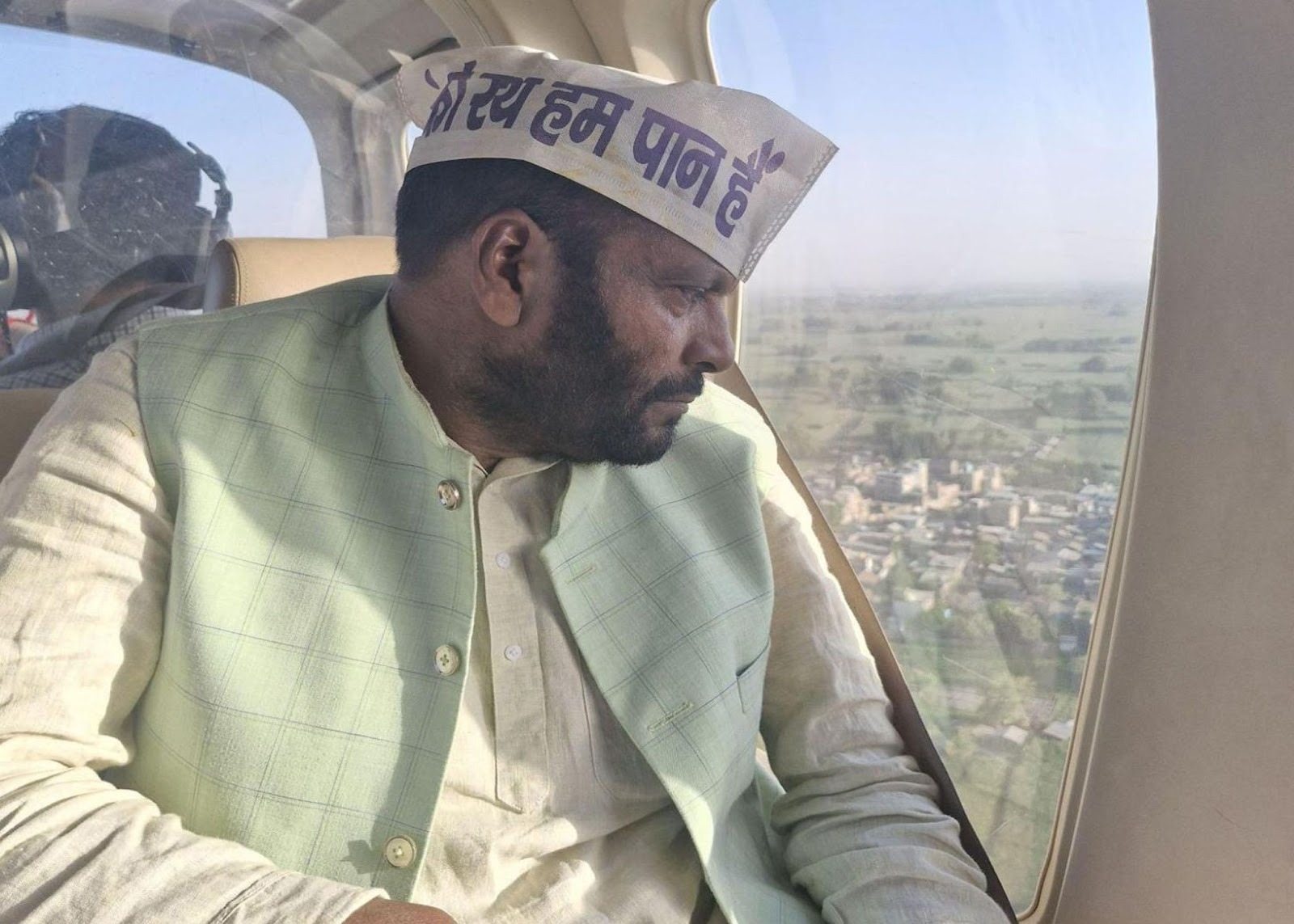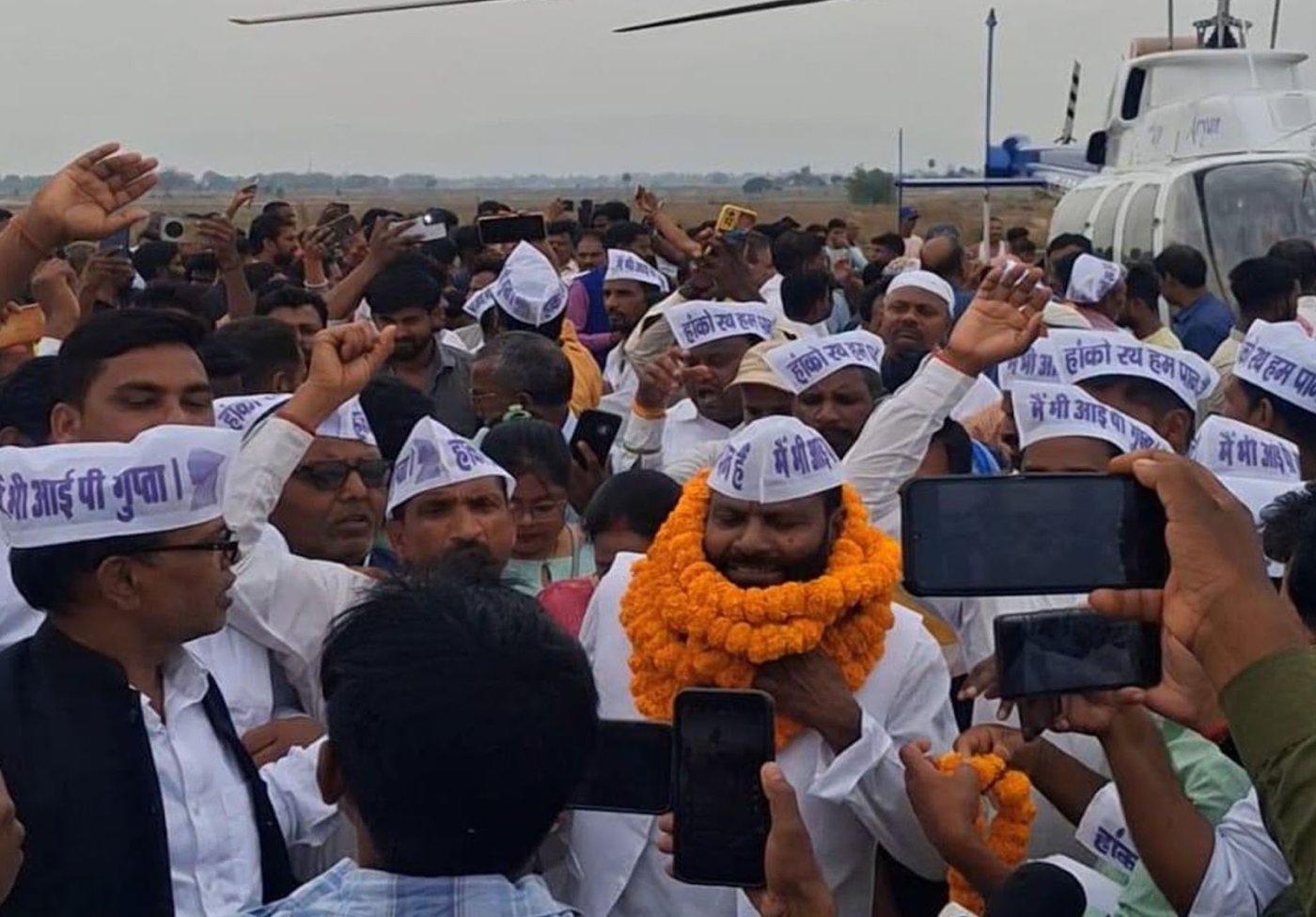Patna: On 13 April 2025, thousands gathered at Gandhi Maidan in Patna, carrying navy blue, white, and green flags with spinning wheels at their center. Many wore Gandhi caps with the slogan "Haanko Rath, Hum Pan Hai!" ("Gallop the Chariots, We Are Pans!").
This wasn't just another political rally. It marked the birth of a new party that could disrupt the electoral math in India’s poorest and second most-populous state.
Launched as the Indian Inquilab Party, and now renamed the Indian Inclusive Party (IIP), has joined the Mahagathbandhan—a coalition of parties opposed to the ruling National Democratic Alliance (NDA)—and is contesting three constituencies: Saharsa, Jamalpur and Beladaur.
Led by a burly, bearded engineer called I P Gupta, who has filed his nomination from Saharsa, the IIP represents the Tanti-Tatwa community—traditional weavers or Pans, who are part of Bihar's extremely backward classes (EBCs).
These castes make up 36% of the state's population, according to the 2023 Bihar Caste Survey, and its largest voting bloc. The specific size of the Tanti-Tatwa community—the official name of the Pans—within this larger group isn't officially documented, but they are now demanding better reservation benefits.
Their story reveals the messy reality of India's caste-based reservation system and why it's becoming a major headache for Bihar's political establishment ahead of state elections in November 2025.
At Stake: Jobs & Livelihoods
The Tanti-Tatwa movement exposes fundamental cracks in India's reservation system in an unequal country with inadequate education and employment opportunities.
Bihar's EBC communities are demanding reclassification from their current category to scheduled castes. Such a reclassification offers better job quotas and college admissions.
While EBCs currently receive 25% reservation in state jobs and educational institutions, scheduled castes are entitled to 20% along with stronger legal safeguards, targeted scholarships, and central schemes exclusive to scheduled castes.
Admissions to government colleges, including engineering and medical programmes, and recruitment for public sector jobs follow this reservation matrix. However, only Parliament can approve changes to the scheduled-caste list, making such reclassification legally complex.
Similar movements are erupting across India as marginalised groups compete for limited reservation benefits.
For instance, in Rajasthan, Gujjars are demanding scheduled caste status; in Uttar Pradesh, Nishads, and in West Bengal and Jharkhand, Kurmis.
The emergence of new political parties like the IIP threatens established coalitions that have governed Bihar for decades.
For Nitish Kumar, this represents an existential political crisis. His entire electoral strategy depends on holding together EBC communities who feel increasingly ignored by mainstream parties.
If they start voting for their own leaders instead of staying loyal to established parties, Bihar's political landscape could shift dramatically.
The stakes extend beyond Bihar. India's upcoming caste census—the first since 1931—could provide data to support reclassification demands nationwide, potentially triggering a wave of similar movements.
This "race against the bottom" dynamic could reshape caste politics across the country, as communities fight for recognition and resources in an increasingly competitive system.
The Promise That Backfired
In 2015, chief minister Nitish Kumar handed the Tanti-Tatwa community what seemed like a political gift: his government reclassified them from EBCs to scheduled castes—a move that opened doors to better job quotas and college admissions.
For nine years, thousands of Tanti-Tatwa youth used this SC status to secure government jobs and university seats.
Then the Supreme Court stepped in.
In 2024, the court ruled that Bihar had no authority to change the scheduled-caste list—only the central government can do that. The verdict suddenly stripped everyone who had benefited from scheduled-caste reservations of their status.
"I cleared the CGL (combined graduate level) exam (to select state officials) under the SC quota, but after the verdict, I was asked for an EBC certificate,” said Vikas Kumar Das, 29, an arts graduate from Muzaffarpur. “I fell short of the EBC cutoff and lost my job."
The court ordered the immediate removal of all Tanti-Tatwa individuals from positions reserved for scheduled castes, arguing they had taken opportunities away from "genuine" scheduled-caste candidates.
Bihar's Largest Voting Block
The Tanti-Tatwa community is part of Bihar's EBCs—a 36% chunk of the state's population that has become crucial to winning elections. Despite being the largest caste group, they face crushing poverty that rivals traditionally marginalized communities.
Recent government data are revealing: a third of EBC households earn less than Rs 6,000 per month. Only 1% work in government jobs, and just 4% are college graduates. In some districts, entire Tanti-Tatwa families own no land.
These numbers matter because they fuel political demands. When communities this large feel ignored, they can swing elections.
The Nitish Calculation
Nitish Kumar built his political career on an unusual formula.
Coming from the small Kurmi community (just 3% of Bihar's population), he couldn't rely on caste loyalty alone. Instead, he stitched together a coalition of Hindu and Muslim EBCs to challenge Lalu Prasad Yadav's dominance.
The strategy worked brilliantly. In 2005, Nitish's campaign helped elect 19 EBC lawmakers—a record at the time. He gave EBCs 20% reservation in local body elections, ensuring grassroots political representation.
But promises of economic upliftment haven't materialized. Government jobs remain scarce, and poverty persists. The Tanti-Tatwa reclassification was Nitish's desperate attempt to show results—an unconstitutional shortcut that backfired.
Now, with state elections approaching, his EBC support base is cracking.
Participants at the Patna Pan rally openly criticized him. "Nitish Kumar gave us SC status in 2015 but failed to secure it constitutionally," said Shashi Kumar from Bhagalpur. “This is a betrayal.”
The New Political Math
Engineer Gupta's movement represents, as we said, something bigger than one community's grievances. It's part of a nationwide trend where marginalised groups are demanding better treatment through the ballot box.
Gupta's statewide campaign using helicopters and traditional chariots drew massive crowds.

His criticism targeted all three branches of government: the judiciary for prioritising legal technicalities over social justice, the legislature for failing to amend outdated lists, and the executive for implementing court orders without considering human consequences.
““None of the parties give us tickets. Part of this problem is that we don’t have any history, ” said Gupta.
“As Ram Vilas Paswan (a former union minister from Bihar and founder of the Lok Janshakti party) had said, a community which doesn’t have a history, won’t have any faces or recognition.”
The emergence of the IIP poses a direct threat to Nitish Kumar's carefully constructed caste coalition. If EBC communities start voting for their own leaders instead of staying loyal to established parties, Bihar's political landscape could shift dramatically.
Similar patterns are emerging across India. In Uttar Pradesh, EBC leaders like Sanjay Nishad (NISHAD Party), and Om Prakash Rajbhar (Suheldev Bharatiya Samaj Party) have launched their own parties, often switching alliances based on who supports their reclassification demands.
In Bihar, apart from the IIP, a stage designer called Mukesh Sahni in 2018 launched the Vikasheel Insaan Party, representing the Nishads. VIP has been successful in mobilising Nishads, calling for their recategorisation as a scheduled caste community, but the party has not seen any major electoral victory until now.
The Electoral Stakes
Bihar's upcoming elections will test whether Nitish Kumar can hold his EBC coalition together. The Tanti-Tatwa case has exposed the limits of state-level reservation policies when constitutional changes require central government approval.
For the ruling NDA, the IIP’s inclusion in Mahagathbandhan poses a risk. With Gupta and Sahini, the Mahagathbandhan has steered itself towards EBC voters, denting NDA’s electoral base.
The opposition Rashtriya Janata Dal (RJD) faces similar calculations. Lalu Prasad Yadav originally built EBC support through the Karpoori formula—a 1978 Bihar government policy for job reservations that allocated 26% of government jobs to disadvantaged groups—in 1992, but his party's focus on OBC communities has left many EBCs feeling neglected.
The IIP has put forward three key demands: restoration of their scheduled caste reservation status; a comprehensive review of the Supreme Court verdict affecting promotions, appointments and admissions; and assured political representation. Their inclusion in Mahagathbandhan is reflective of NDA’s limitations towards engaging with such demands.
The IIP has created a significant base in Madhubani, Saharsa, Munger, and Bhagalpur districts.Gupta claimed the party has built the capacity to mobilise between 5,000 and 525,000 votes in constituencies it seeks to contest.
The Caste Census Factor
India's upcoming caste census—the first since 1931—adds another variable to this political equation. The exercise could provide data to support reclassification demands, potentially triggering a wave of similar movements across the country.
EBC communities see the census as validation of their demands. If the data shows their socio-economic conditions match those of SC communities, it strengthens their case for reclassification.
But the census could also intensify competition between marginalized communities, as groups fight for limited reservation benefits. This "race against the bottom" dynamic could reshape caste politics nationwide.
What's Next
The Tanti-Tatwa movement reveals fundamental questions about India's reservation system. Can it evolve to meet complex realities of caste-based discrimination? How should limited benefits be distributed among competing marginalized communities?
For Bihar's politicians, these aren't abstract policy debates. They're electoral calculations that could determine who wins and loses power. The state's EBC communities—more than a third of the population, as we said—are watching closely.
Engineer Gupta's helicopter campaigns and traditional chariot rallies have already changed the conversation. Whether they can change election outcomes remains to be seen. But in a state where caste arithmetic often determines political fortunes, no established party can afford to ignore this challenge.
As Bihar heads toward elections, their demand for recognition has become a test case for whether India's reservation system can adapt to contemporary realities—or whether frustrated communities will seek change through the ballot box.
(Arghya Bhaskar is an independent journalist based in Delhi and Ritin is an interdisciplinary researcher and writer based in Jharkhand.)
Get exclusive access to new databases, expert analyses, weekly newsletters, book excerpts and new ideas on democracy, law and society in India. Subscribe to Article 14.

